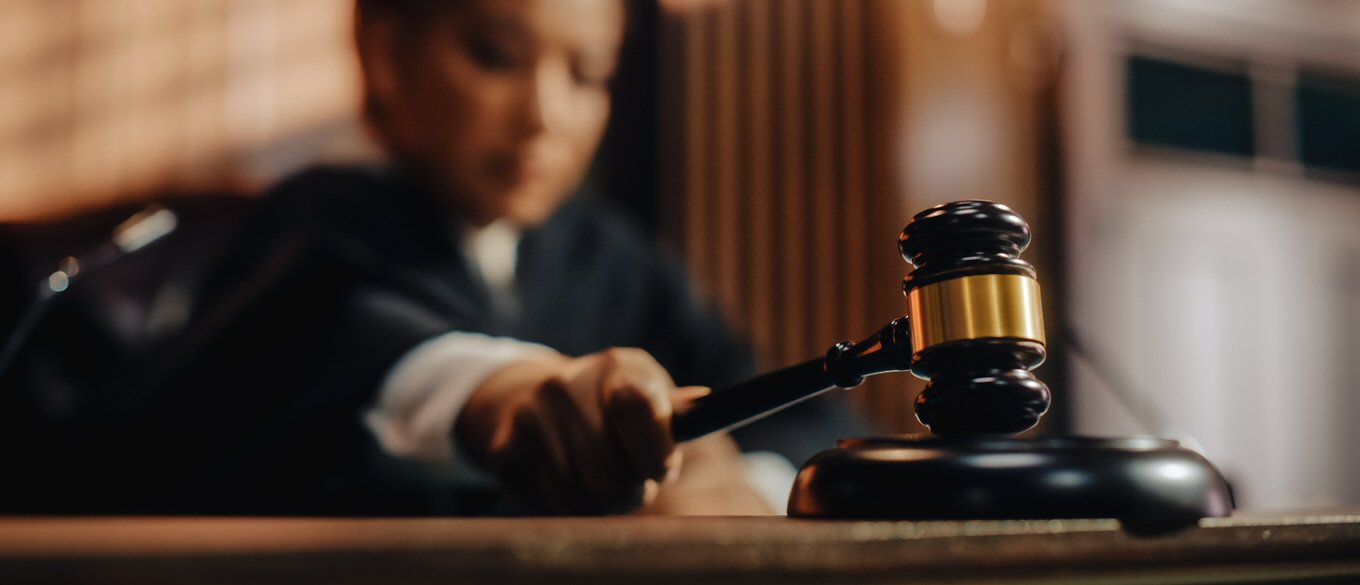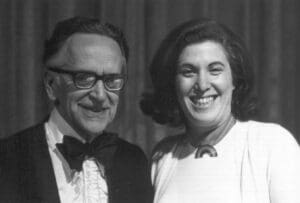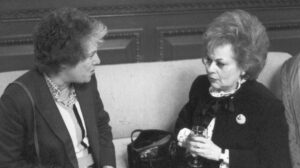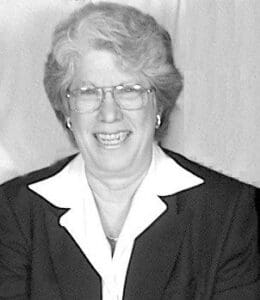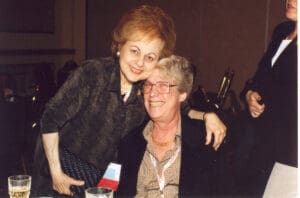The Extraordinary Women of the Empire State:
A History of the Women’s Bar Association of the State of New York
By Barbara H. Grcevic
A vision. A mission. A few inspired women. These elements converged to give rise to the creation of the Women’s Bar Association of the State of New York (WBASNY). These same elements continue to drive WBASNY’s growth. In 2019, WBASNY comprised twenty chapters throughout the State of New York and a membership of more than 4,000. WBASNY is now the largest women’s bar association in the country and the second-largest statewide bar association in New York. As illustrated in the film “WBASNY – A Brief History” (available on YouTube), today WBASNY is advancing its mission upstate, downstate and all points in between. “Her story” is our history:
In the late 1970s, a group of women lawyers from throughout New York State decided to unite with one voice to address their professional concerns and confront gender bias. These lawyers, led by Joan Ellenbogen and the Manhattan-based New York Women’s Bar Association, reached out to other regional women’s bar associations in an effort to gain a statewide presence. The women formalized their efforts at a convention held at Grossinger’s Catskill Resort Hotel in Liberty, New York, during the weekend of April 18, 1980. After significant discussion and compromise, they formed the Women’s Bar Association of the State of New York. The initial five women’s bar association chapters that made up WBASNY were Capital District, Central New York, New York (Manhattan), Staten Island and Westchester.
The purposes of the new association were specified in its Certification of Incorporation, filed on July 19, 1980. The mission was clear:
• to establish and direct policies and issue policy statements on issues of statewide, national or international significance, especially those relating to women lawyers and women generally, including but not limited to state or national legislation, international compacts, state-wide judicial office, state or national judicial policy;
• to cooperate with, aid and support organizations and causes which advance the status and progress of women in society;
• to facilitate the administration of justice;
• to elevate the standards of integrity, honor and courtesy in the legal profession; and
• to cultivate the science of jurisprudence.
Joan Ellenbogen, WBASNY’s driving force, became its first president. During her two-year term, Ms. Ellenbogen solidified WBASNY’s position among other state bar associations by representing WBASNY at joint meetings attended by these bar associations. She strengthened WBASNY’s internal network by continuously contacting WBASNY’s chapter organizations to obtain consensus on various issues affecting women generally and WBASNY in particular. In 1981, recognizing Ms. Ellenbogen’s accomplishments in promoting women, the Hon. Lawrence H. Cooke, Chief Judge of the Court of Appeals, appointed Ms. Ellenbogen to the judicial selection committee for the Court of Appeals.
WBASNY’s next president, Marjorie E. Karowe, continued WBASNY’s mission by conducting a campaign to recruit more local women’s bar chapters into WBASNY. By 1985, due in large part to Ms. Karowe’s organizational skills and efforts, WBASNY had grown from its original five chapters to include the following additional chapters: Bronx, Brooklyn, Mid-Hudson, Nassau-Suffolk, Orange-Sullivan, Queens, Rochester, Rockland and Western New York. The Capital District chapter became the center for WBASNY’s legislative outreach. WBASNY members Marilyn Menge, Rachel Kretser (WBASNY’s chief liaison with the State legislature throughout the mid-1980s) and Barbara Billet all had legislative-related jobs. They became WBASNY’s intermediaries, communicating with WBASNY’s Legislation Committee, its Board and the State Legislature.
WBASNY’s Legislation Committee brought WBASNY its greatest visibility during the early years and continues to do so today. The Legislation Committee reviews bills and issues reports and recommendations to the New York State Legislature. Accordingly, over the years, WBASNY has achieved significant progress for women throughout New York State. In 1992, WBASNY’s then-Vice President, Rachel Kretser, testified as follows before the Legislature with reference to WBASNY’s position on proposed legislation concerning the merit selection of judges:
Our goal must be a judiciary where the number of women and minority judges fairly reflects the number of women and minorities in the bar. More women and minority judges at all levels of our complex court system will not only contribute to the vital work of our legal system, it will also help eradicate the continuing discrimination against women and minority litigators and litigants. The way we can achieve that goal is to develop a system of judicial selection, whether appointive or elective, which is based upon merit rather than political expediency.
A few examples of legislation that was enacted or not enacted, due to WBASNY’s efforts, illustrate the range of WBASNY’s involvement:
• Led by Norma Blumenfeld Grill, of the Nassau chapter, WBASNY mounted a campaign advocating passage of Private Clubs Anti-Discrimination Bill, which prohibited discrimination against women and minorities in private clubs with one hundred or more members, regularly serve meals and permit nonmembers to use the facilities. The bill passed in June 1994 – barely months after the Hon. Judith Kaye, Chief Judge of New York State’s highest court, was turned away from the dining room of an all-male New York City club.
• More recently, WBASNY supported Lavern’s Law, which provides equal access to justice for victims of a failure or delay in diagnosing cancer. The failure or delay in diagnosing cancer disproportionately affects women, as women routinely undergo annual mammograms and other annual gynecological testing and are more vulnerable to and at a higher risk of being a victim of this type of medical error. Lavern’s Law, which is also known as the “date of discovery” rule, allows the statute of limitations to start running from the date the victims learn or should have learned they have cancer. The bill was signed into law in early 2018.
• WBASNY has repeatedly opposed death penalty bills and has consistently supported pro-choice legislation.
• WBASNY has endorsed the right of patients to make health care decisions and leave advance healthcare directives.
• WBASNY took a leading role in support of legislation improving court facilities, including the support of lactation rooms in courthouses.
Increasingly, legislators have called upon WBASNY’s expertise when drafting bills on matrimonial reform, domestic violence, the practice of law and numerous other legal issues. By 1998, WBASNY’s legislative activity had expanded so much that WBASNY hired Barbara Shack to work part-time as its professional liaison with the State Legislature, thereby increasing WBASNY’s accessibility to bill sponsors. (You may visit https://www.wbasny.org/legislation/ to see a list of proposed legislation that WBASNY has reviewed.)
The Legislature and various task forces and commissions have also solicited WBASNY’s opinion on numerous occasions. For example, in 1986, WBASNY was acknowledged in the preface to “The Task Force Report on Women in the Courts” for distributing the Task Force’s Attorney Survey. The Task Force identified gender bias in courts throughout the State and made specific suggestions for its elimination. The Hon. Florence Shientag, a founder of the New York (Manhattan) chapter in 1935, sat on the Task Force Commission, as did Sharon Sayers of the Rochester chapter and the Hon. Sybil Hart Kooper of the Brooklyn chapter. Lucia Whisenand of the Syracuse chapter sat as one of four expert advisers on issues relating to women in the courts. In its report, the Task Force concluded that “gender bias against women litigants, attorneys and court employees is a pervasive problem with grave consequences. Women are often denied equal justice, equal treatment, and equal opportunity.”
WBASNY also states its position on key issues before the courts. In this regard, WBASNY has signed onto and written numerous, significant amicus briefs, expressing its view on points of law affecting its members. Among these many amicus briefs are Ezold v. Wolf, Block, Schor and Solis-Cohen, concerning a woman attorney’s denial of partnership; Elaine W. v. Joint Disease North General Hospital, Inc., on sex discrimination in reproductive health care; Thoreson v. Penthouse International Ltd., involving sexual harassment; Clark v. K-Mart Corp., on health coverage for breast cancer treatment; Hope v. Perales, on funding medically required abortions for needy women; United States v. Windsor, in which the U.S. Supreme Court held that restricting the federal interpretation of “marriage” and “spouse” to apply only to opposite-sex unions is unconstitutional; and Matter of Brooke S.D. vs. Elizabeth A.C.C., in support the plaintiff who sought custody and visitation of the son of the respondent after a same-sex partnership ended.
WBASNY has actively encouraged its members to support organizations and endeavors that advance the interests of women. WBASNY is a charter member of Judges and Lawyers’ Breast Cancer Alert (JALBCA). Founded in March 1992, JALBCA is an organized effort inspired by the death of the Hon. Sybil Hart Kooper from breast cancer and dedicated to the elimination of this common cancer among American women. In October 1992, WBASNY, as a member of JALBCA, organized the first “Courthouse Alert.” The “Alert,” which operated out of courthouses throughout the State, involved volunteers distributing literature, scheduling mammograms and informing the public about breast-cancer screening facilities and services. JALBCA presents annual symposiums on cutting-edge regulatory, industry and legal issues relevant to the search for a cure and access to treatment for breast cancer. To encourage early screening, JALBCA sponsors “Scan Vans” – mobile mammography suites, which have provided mammograms to 1,184 women, half of whom were uninsured. In 1992, JALBCA garnered WBASNY the National Conference of Women’s Bar Associations’ Annual Award for Public Service.
To ease the economic impact of cutbacks in legal-services funding for the indigent, the majority of whom are women and children, WBASNY organized a Pro Bono Domestic Violence Project in 1996. The project was inspired by a private, independent not-for-profit legal services organization started by the Capital chapter in 1995. Thirty volunteers and a group of experienced attorney mentors participated in establishing the project and providing pro bono representation to victims of domestic violence at every stage of the legal process. Twenty years later, in 2016, Jacqueline Flug and Claire P. Gutekunst, the respective presidents of WBASNY and the New York State Bar Association (NYSBA), embarked on a joint Domestic Violence Initiative to enhance access to legal services by victims of domestic violence. The Initiative produced a five-credit CLE program that was presented by a faculty of experts in domestic violence, videotaped at NYSBA’s headquarters in Albany, publicized by both NYSBA and WBASNY and offered at no charge to members and non-members of NYSBA and WBASNY.
Members from chapters across the state contribute their time and expertise on such substantive law committees as Criminal Law, Domestic Violence, Elder Law/Trusts & Estates, Environmental Law, Equal Opportunity in the Profession, Family and Matrimonial Law, Health Law & Reproductive Rights, Intellectual Property, Labor and Employment Law, and International Women’s Rights. For example, in 2017, WBASNY’s Committee on Equal Opportunity in the Profession provided written testimony to New York State Lieutenant Governor Kathy Hochul and New York State Labor Commissioner Roberta Reardon, on wage equality. WBASNY approved the Committee’s position statement on wage equality, which is posted on the website (https://www.wbasny.org/legislation/2017-wage-equality/). WBASNY publishes articles on substantive law, sponsors U.S. Supreme Court bar admissions for its members and offers substantive CLE seminars throughout the year.
WBASNY comments on issues of national and international significance. In 1991, WBASNY publicly opposed the nomination of Judge Clarence Thomas to the U.S. Supreme Court. In 1993, the International Women’s Rights Committee, co-chaired by Wendy Lazar and Deborah Volberg, was formed. The Committee considered reports of the rape and torture of Muslim women during the civil war in the Balkans, and WBASNY sent a letter to the U.S. District Court for the Southern District of New York in support of the Bosnian women’s class action for damages against Serbian leader Radovan Karadzic. Through this committee, WBASNY also lobbied for the United States’ signing the United Nations’ Convention on the Elimination of All Forms of Discrimination Against Women. The efforts of the Committee have also resulted in WBASNY’s achieving Non-Governmental Organization (NGO) status with The United Nations’ Department of Public Information.
WBASNY’s numerous awards acknowledge the significant contributions of women lawyers to the profession, WBASNY and the community. In 1985, the annual Joan Ellenbogen Award, later renamed at Ms. Ellenbogen’s insistence as the Founders’ Award, was established. This award honors women of outstanding achievement who have made significant contributions to the profession. The first recipient was the Hon. Betty Weinberg Ellerin, a Past President of the National Association of Women Judges, WBASNY and the New York Chapter, and the first woman to serve on the Appellate Division in New York State. In 1988, WBASNY created an annual service award to honor a WBASNY member who made significant contributions to WBASNY. The award was named after Marilyn Menge, from the Capital chapter. Ms. Menge chaired the WBASNY Legislation Committee for two years and served as WBASNY’s Secretary and Vice President. During her term as Secretary, she was diagnosed with ovarian cancer. Despite receiving frequent chemotherapy treatments, she never missed completing a set of minutes. Ms. Menge was remarkable, not only for her tireless work, but also for her exceptional diplomacy and consensus-building skills. The first recipient of the Marilyn Menge Award was Marjorie Karowe in 1988. In 1996, WBASNY gave its first Pro Bono Award to Hannah S. Cohn of Rochester. The Award acknowledges a WBASNY member who makes significant contributions to the provision of pro bono legal services to the community in which she practices. And in 1995, the Hon. Marie Santagata from Nassau received WBASNY’s first Lifetime Achievement Award. (You may visit https://www.wbasny.org/wp-content/uploads/2018/11/WBASNY-Award-Recipients.pdf to view a complete list of all WBASNY award winners.)
Awards are presented at WBASNY’s Annual Convention in the late spring. Leading lawyers and judges in their respective fields have served as convention presenters, and many of these practitioners and scholars are women and WBASNY members. Among the numerous notable speakers who have addressed WBASNY’s members at convention luncheons and dinners are Janet Reno, former U.S. Attorney General; Jeanine Pirro, former Westchester prosecutor, judge and now TV personality; and Mary Jo White, the first woman to be the United States Attorney for the Southern District of New York and former Chair of the United States Securities and Exchange Commission.
WBASNY recognizes the successes of women who have been appointed or elected to public office. On May 4, 1993 WBASNY joined Governor Mario Cuomo to celebrate the appointment of the State’s first woman Chief Judge, the Hon. Judith S. Kaye. The event was also the first WBASNY reception to recognize the many contributions by the elected women of the New York State Senate and Assembly. A second WBASNY reception for the women in the Legislature was held on June 7, 1994, also co-sponsored with the Governor. The honorees included the Hon. Carmen Beauchamp Ciparick, who was newly appointed to the Court of Appeals, and the Hon. Karen Peters, who was newly appointed as the first woman judge to the Appellate Division, Third Department. Similarly, WBASNY’s nominee, the Hon. Betty Weinberg Ellerin, received the American Bar Association’s 1993 Margaret Brent Women Lawyers of Achievement Award, a service award named in honor of the first American woman lawyer. Judge Ellerin, a WBASNY founder, has worked relentlessly for the equality of women in the profession and has actively assisted many women in their quest to attain judicial office. WBASNY established the Betty Weinberg Ellerin Mentor Award in her honor, and on April 4, 2019, WBASNY sponsored a gala celebration of Judge Ellerin’s 90th birthday. The event drew judges, attorneys and public officials from throughout the state.
Today, decades after the publication of “The Task Force Report on Women in the Courts,” women have advanced to the highest echelons of the profession. Four women have been appointed to the highest court in the country, the United States Supreme Court: Hon. Sandra Day O’Connor, Hon. Ruth Bader Ginsburg, the Hon. Elena Kagan and the Hon. Sonia Sotomayor. Several women have also been appointed to the highest court in New York State, the New York State Court of Appeals: Hon. Judith Kaye, former Chief Judge; Hon. Janet DiFiore, current Chief Judge; Hon. Carmen Ciparick; Hon. Jenny Rivera; and Hon. Leslie Stein. Women have served as presidents of the New York State Bar Association and American Bar Association. Women comprise almost half of the nation’s law school classes and a quarter of the profession. Yet, law school faculty, judges, partners and general counsels remain overwhelmingly male. So, decades later, WBASNY’s mission is not complete.
Promoting women and their accomplishments remain among WBASNY’s core objectives. After her installation in May 2018, WBASNY President Greta Kolcon announced a “Promotion Project,” to encourage each member to nominate at least one qualified woman for recognition or an award. The goal: to promote 5,000 women in the legal profession. “Cultural barriers persist, interfering with the promotion of women commensurate with their skills and accomplishments,” Ms. Kolcon explained. “WBASNY’s mission of advancing women is advanced if our members are promoted within the profession.” The “Promotion Project” garnered WBASNY a 2019 Outstanding Member Program Award from the National Conference of Women’s Bar Associations.
WBASNY continues to expand its efforts to advance the skills and status of women lawyers and to further the rights of all women. In the face of continued resistance, success comes to the persevering. It is through the collective efforts of the members of the Women’s Bar Association of the State of New York that laws guaranteeing women equal opportunity and equal treatment will be enacted and manifestations of gender bias will be eradicated. As philosopher and early feminist Simone de Beauvoir stated: “[In] mass action women can have power. The more women become conscious of the need for mass action, the more progress will be achieved.”
WBASNY thanks Barbara H. Grcevic, an active WBASNY member since 1986 and past President of the Brooklyn chapter, for her significant contributions in researching and drafting WBASNY’s History, and WBASNY Officer Joy A. Thompson for updating and editing the article.
Joan L. Ellenbogen, Esq.

